Current as of: February 21, 2026 - 17:42

Cycling in Japan Trip Notes
- Ways to Travel: Guided Group
- Destination: Japan
- Programmes: Cycling
-
Activity Level:
4 out of 7 - Moderate & Challenging
- 14 Days: Land Only
- Ages: 16+
- Trip Code: MOJ
- Carbon Footprint: 15kg CO2e
Trip Overview
From Tokyo to Kyoto, enjoy a road-based bike tour in the Land of the Rising Sun
There is no better way to experience the ever-changing landscapes of Japan than on two wheels, as we pedal along the Fukui coast to the picturesque farmlands and remote mountainous regions of Takayama and Unesco-listed Shirakawa-go. From temples, shrines and markets to hot springs, this trip offers excellent rural cycling without compromising on the cultural elements. No trip to Japan would be complete without a visit to Kyoto, with its Zen gardens and geisha districts, and futuristic Tokyo, sprawling, inimitably busy and extraordinary.
Cherry blossom season: Experience the ephemeral beauty of cherry blossom season in Japan, when the sakura trees bloom with delicate pink blossoms. See the Dates & Prices tab for our special departures.
At a Glance
- Accommodation: 12 Classic nights (11 hotels, 1 traditional Japanese ryokan/minshukus), 1 Simple night (gassho-zukuri farmhouse)
- Nine days of cycling with partial vehicle support (limited seats)
- Group normally 4 to 14, plus leader. Minimum age: 16
- Special cherry blossoms and autumn colours departures
Highlights
- Cycle rural roads through peaceful Japanese countryside
- Discover temples, Zen gardens and geisha districts in Kyoto
- Ride the tranquil Fukui coast by the Sea of Japan
- Visit the Unesco-listed historic village of Shirakawa-go
Is This Trip for You?
This trip is classified as Road and Activity Level 4 (Moderate & Challenging). For more information on our trip gradings please visit the Activity Level Guidelines page. If you have any queries about the difficulty of the trip please do not hesitate to contact us.
- Nine days of cycling
- Average 37mi (60km) per day
- Partial vehicle support (with limited seats)
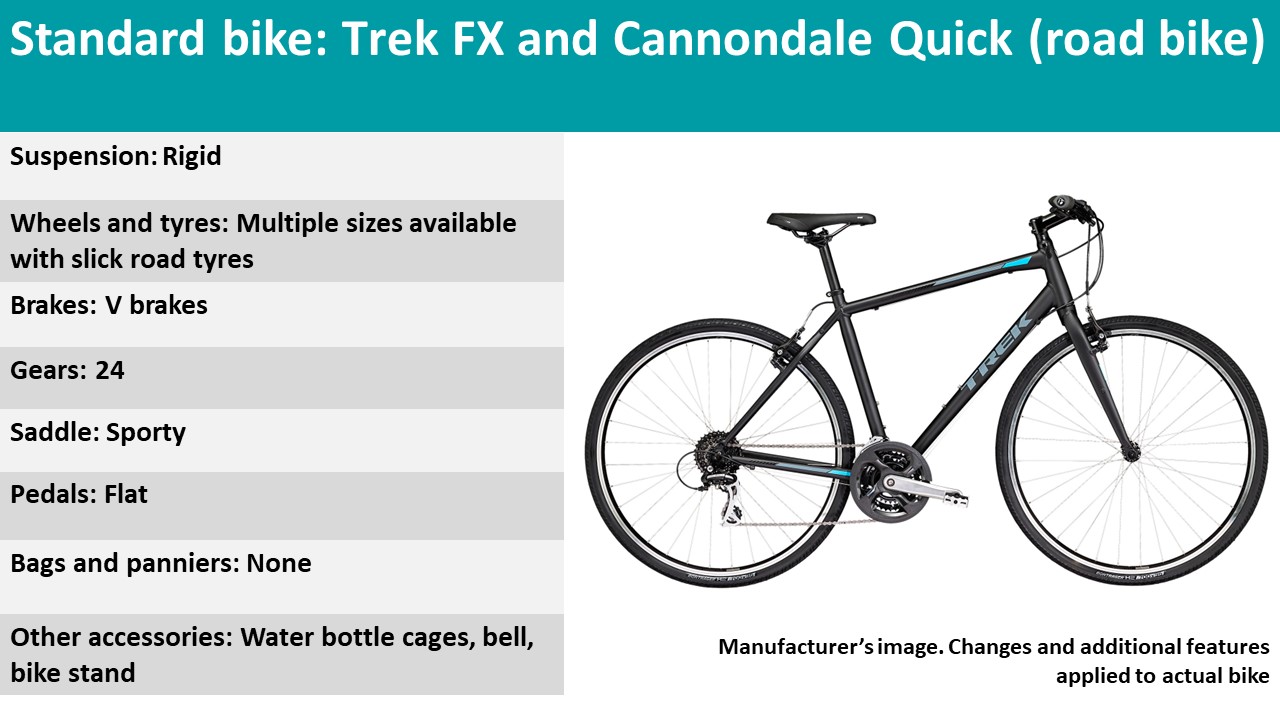
We cycle more than 310mi (500km) over nine days with an average of 37mi (60km) per day, so a good level of fitness is required. We cycle mostly on surfaced roads with a few sections on country lanes, cycle paths and gravel. The routes are mainly undulating but they get hillier on the inland section to Takayama and Shirakawa-go, where we face some steady climbs. A support vehicle (with limited seats) accompanies us throughout, except for the city bike tours in Kanazawa and Kyoto.
Routes follow mainly quiet backroads with low levels of traffic, but this does increase when approaching towns. We aim to cycle most of the route door-to-door, with only a few transfers and train rides organised to shorten some distances and avoid busier roads. Most rides will include some short sections through lit tunnels.
Please note: Bike hire is included and there is no option to bring your own bike on this trip.
Travelling with us in Japan: We rely on the country’s world-renowned public transportation network, making our Japan trips unique compared with our tours in other destinations, in which we generally use private transportation. Public transport here is accessible, clean and punctual. It’s also intrinsically woven into the local way of life, which is why we encourage travellers to embrace this way of travelling in Japan.
Before you go: We recommend downloading the Uber or GO Taxi apps before you arrive, as both are widely used in Japan. The Google Translate app will also be useful.
Accommodation: Some nights are spent in Japanese-style accommodation and guesthouses with shared facilities.
Group
There will be a local cycling leader and an assistant leader driving the support vehicle.
Adult min age: 16
Min group size: 4
Max group size: 14
Itinerary

Land Only
- Start City: Tokyo
- End City: Kyoto
Land Only Itinerary
Our tour starts in Tokyo, the busy capital of Japan, which has a unique contrast of ultramodern and traditional, from neon-lit skyscrapers to historic temples.
Around 6pm, say konnichiwa to your tour leader and fellow travellers, when we gather as a group for the first time to get to know each other and learn more about the adventures ahead.
Your tour leader then ensures a big Japanese welcome by arranging a group dinner.
Want more time in Tokyo? Secure pre-tour hotel nights through your sales representative.
Accommodation: Shinagawa Prince Hotel or The B Ochanomizu (or similar)

Today we enjoy a half-day orientation tour encompassing some of the city highlights, starting from the popular Asakusa district, where we visit Senso-ji, a seventh-century Buddhist temple. We approach the temple via the Nakamise, a shopping street home to a variety of traditional snacks and souvenirs. We then continue towards the Ueno area and walk through the beautiful public park filled with temples, shrines and about half a dozen museums. The afternoon is free for individual sightseeing; your leader can recommend other local attractions, such as Shibuya, known for the busy crossing, and Meiji Shrine.
Accommodation: Shinagawa Prince Hotel or The B Ochanomizu (or similar)
In the morning, we take the express train (approximately 2hr 30min) to Kanazawa, in the western Ishikawa Prefecture, an atmospheric town that once rivalled Kyoto as the historic jewel of mainland Japan. After lunch, we enjoy a short cycling loop around the city, a good opportunity to fine-tune the bikes while enjoying some of the main attractions in town. We ride through the popular Nagamachi Samurai District, an area that preserves a historic atmosphere with samurai residences, narrow lanes and canals. We also visit Kenrokuen, one of the most beautiful landscape gardens in Japan, which is particularly spectacular during cherry blossom and autumn season.
Accommodation: Dormy Inn Kanazawa (or similar)
We depart Kanazawa after breakfast and cycle to the sea on a dedicated cycling path along the rugged coastline and past fishing villages. After a leisurely and flat ride by the Sea of Japan, we arrive at Kaga, a town known for hot springs and traditional crafts. Here, we take a break from cycling to enjoy a local lunch.
Recharged and rejuvenated, we visit the splendid house of a ship owner from the Edo period before continuing the journey towards the resort town of Kyukamura, our final destination, and enjoy sunset at nearby Oshima Bridge.
Accommodation: Kyukamura Echizen Mikuni (or similar)
Cycle south along the Echizen-kaigan coastline, winding past dramatic cliffs and cascading waterfalls. Along the way, we pause for a scenic oceanside lunch before turning inland towards the town of Echizen, the city of artisans.
Accommodation: Route Inn Takefu Inter Hotel (or similar)

We start with a deep dive into the world of traditional Japanese knife-making at the Takefu knife village. During our visit, we not only learn about this centuries-old craft, but also make our own letter opener.
Afterwards, we stop at an inn from the late Edo period where you can order soba noodles before riding towards Tsuruga through the former Hokuriku railway line.
This evening, we enjoy a dinner at a local restaurant in the village of Tsuruga, where we spend the next two nights.
Accommodation: Hotel Granbinario Tsuruga (or similar)
After breakfast, for our final ride in the Fukui prefecture, we embark on a loop around the five lakes of Mikata and Wakasa Bay, including a break for lunch at a seafood restaurant in a tranquil setting.
Today’s cycling route also passes through Wakasa Wan Quasi-National Park and offers magnificent views throughout.
Accommodation: Hotel Granbinario Tsuruga (or similar)
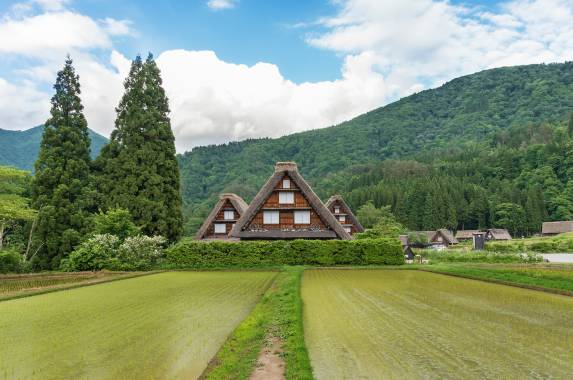
We take a break from cycling today and experience a dramatic change of landscape as we travel inland by shinkansen (bullet train) to Kanazawa and then bus (approximately three hours) to Shirakawa-go, a secluded mountainous region cut off from the rest of Japan for a long period of time. Villages in this area are famous for their traditional gassho-zukuri farmhouses, which were declared a Unesco site in 1995. Their unique architectural style is characterised by steep thatched roofs, built to withstand heavy winter snowfall, and provide a large attic space for the cultivation of silkworms. We arrive in Shirakawa-go in the afternoon in time to enjoy a leisurely walk through the picture-perfect mountain village, with the opportunity to visit some of the oldest buildings. Although not always guaranteed due to limited availability, we usually spend the night at one or more gassho-zukuri, run by local farmers, allowing us to get a real feel of a Japanese family home.
Accommodation: Gassho Zukuri Houses or Toyota Shirakawa-Go Eco-Institute (when gassho-zukuri not available)
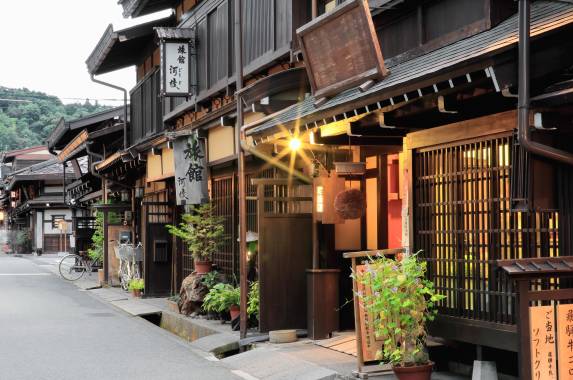
Today is the most challenging ride of the trip as we cycle inland to Hida Takayama, at the foothills of the Japanese Alps. Riding out of Shirakawa-go, from an altitude of approximately 1,640ft (500m), we gradually climb up 3,610ft (1,100m) for the first 28mi (45km) of the route. There are some wonderful views to enjoy along the way, from the picturesque shores of Miboro Lake and quaint rural villages to hillsides and forested valleys that burst into colour during autumn. On the last section of the ride, we enjoy two great descents before reaching our destination: Hida Takayama, often named Little Kyoto because of the similarity of its architecture and quaint atmosphere.
Accommodation: Takayama Ouan (or similar)
Today we cycle the Hida Seseragi Highway, a beautiful route following swift mountain streams (and one of the most popular places to experience the striking autumn colours in Japan). Riding past little villages, shrines and paddy fields, we reach the pleasant riverside town of Gujo-hachiman, known for its pristine waterways and 16th-century castle. Before dinner, we have time for a pleasant stroll through the vibrant town centre and along the atmospheric canals and waterways, which are still used daily by the local people for washing rice, vegetables and laundry.
Accommodation: Onoso Ryokan (or similar)
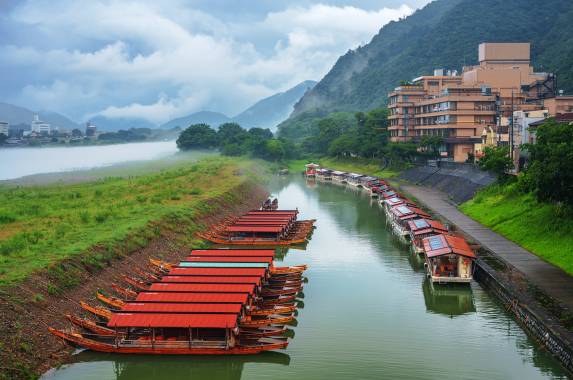
After breakfast, we have the option to walk to the hilltop Gujo Castle built in 1559 by the local feudal lord, where we can enjoy wonderful vistas.
Today’s pleasant and more leisurely ride follows the Nagara River, famed across Japan for its clear water and quiet beauty. Some sections of the riverside are particularly picturesque during cherry blossom season when more than 400 cherry trees are in full and glorious bloom. We pedal along the river for most of the day and stop in the pleasant town of Mino, a century-old production centre of high-quality traditional Japanese paper. Our final destination today is Gifu; we should arrive in time for an optional visit to the castle atop Mount Kinka. We overnight in Gifu City.
Accommodation: Resol Gifu Hotel/Comfort Gifu Hotel (or similar)
We take a break from cycling today; instead, we travel by train (approximately two hours) to the wonderful city of Kyoto. With more than 2,000 temples, shrines and gardens, Kyoto is a treasure house of Japanese heritage and remains one of the most fascinating cities in Asia. Unlike many other Japanese towns, it escaped the ravages of both the Second World War and modern urban development thereby keeping intact much of the spirit and architecture of traditional Japan. The day is free for individual sightseeing with many highlights to explore, including Nijo castle, built in 1603 as a residence for the Tokugawa shoguns; Kiyomiduzera temple; and the scenic Fushimi Inari Shrine, featured in the movie Memoirs of a Geisha (2005). We also recommend a walk in the historic district of Gion, which is at its most atmospheric in the early evening, when the lanterns are lit and apprentice geishas flit about the backstreets as they head to their appointments.
Accommodation: Hotel Monterey Kyoto (or similar)
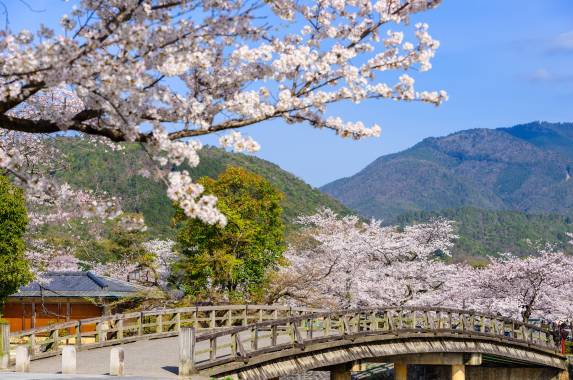
Today’s cycling loop explores some of the best areas and attractions of Kyoto, heading first towards Arashiyama, a pleasant district in the western outskirts of the city. The area has been a popular destination since the Heian Period (794-1185) when nobles would enjoy its natural setting. After pedalling through the charming centre, via the iconic Togetsukyo Bridge and bamboo grove, we continue back into Kyoto following a different route. On the way, we stop for a visit to Ryoanji Temple, the site of the most famous rock garden in Japan, and the splendid Kinkakuji (also known as the Golden Pavilion), an icon of the nation.
Finally, we cycle via the Philosopher’s Path, a pedestrian and cycling path that follows a cherry tree-lined canal in northern Kyoto, until reaching Kyoto station where our last ride finishes.
In the evening, the leader arranges an optional celebratory farewell dinner in one of the most authentic restaurants in the city.
Accommodation: Hotel Monterey Kyoto (or similar)
The tour ends this morning after breakfast. Of course, if you’d like a bit more time to explore, you can speak to your sales representative about extending your stay.
Extend Your Trip
Tokyo Hotels
A city where ancient traditions sit alongside cutting-edge technology, Tokyo is endlessly fascinating, vibrant and full of contrasts. Extra nights here give you time to explore neighbourhoods at your own pace, sample world-class cuisine, and experience the city’s unique blend of culture, design and innovation. Here are a few of our favourite hotels to inspire your stay:
Hyatt Regency Tokyo: Located in the Shinjuku district, this comfortable and well-appointed hotel offers spacious rooms, excellent dining and easy access to transport links. Its calm atmosphere and convenient location make it a great base for discovering Tokyo’s many highlights.
Hilton Tokyo: Set in the heart of Shinjuku, this modern high-rise hotel features stylish rooms with city views and impressive leisure facilities. With direct access to public transport and shopping areas, it’s ideal for travellers wanting convenience and comfort.
Cerulean Tower Tokyu Hotel: Rising above the vibrant Shibuya district, this elegant hotel offers refined rooms with sweeping skyline views and a more boutique feel. Known for its attentive service, quality dining and excellent location, it provides a sophisticated retreat in one of Tokyo’s most dynamic neighbourhoods.
This is just a glimpse of what’s possible. Speak to your sales representative, who can guide you through the options and arrange everything for you.
Ascents, descents and distances: All ascents, descents and distances listed in the daily itinerary have been measured by our local partners or tour leaders, in many cases with satellite-based mapping software. However, different GPS measuring devices can give differing results, particularly on winding paths or in mountainous terrain. Measurements stated throughout these Trips Notes are given to help you understand the types of terrain and distances you will encounter. Timings stated will vary depending on the pace of your group.
Accommodation
Hotels, traditional Japanese-style hotels and ryokans

We use a mix of Western- and Japanese-style hotels and ryokans (traditional Japanese inns).
While ryokans (traditional Japanese inns) are full of local character, rooms do not generally have private bathrooms and bedding is normally thick futon mattresses placed on tatami mats on the floor. Some of the accommodations may have a private onsen, which means you can soak as soon as you arrive, a superb way to recuperate after a day on the bike.
In Shirakawa-go, we usually spend one night in a gassho-zukuri farmhouse − a unique and memorable experience. In the traditional style, guestrooms come with tatami mat floors, futons, and a low table. Toilets are typically modern but shared. Due to limited availability, the group may be accommodated in separate but nearby houses. While single supplements are not available for this accommodation, each room has a maximum of two guests.
Onsen (Japanese public bath)
For many visitors to Japan, the onsen is unfamiliar territory. An onsen is a Japanese hot spring and the bathing facilities and inns frequently situated around them. The combination of a strict bathing etiquette, that nudity is compulsory, and that the water temperature is often hotter than most hot tubs can cause some reluctance for first timers. However, once the courage is mustered, you may discover that an onsen dip is a trip highlight. Please note, you may be refused entry if you have large, visible tattoos. The leader will explain etiquette, but it is expected that you shower before stepping into the hot spring/bath.
Single supplements
A single supplement can be booked only for the 10 hotel nights in Tokyo, Kanazawa, Echizen, Tsuruga, Takayama, Gifu and Kyoto, these are limited and subject to availability. In Japan, often single supplements are accommodated in either a single or a twin-bedded room. Double for sole use rooms are limited in availability and cannot be guaranteed.
Please advise at time of booking if you would like to request a single supplement and we will do our best to fulfill your request.
Worth knowing
- Room sizes and beds in Western-style hotels in Japan are generally smaller. Twin rooms will be provided as standard for two passengers sharing a room, as these offer more space and comfort than double rooms.
- The properties listed in the itinerary are the normal accommodations used. However, there may be some departures where groups stay at similar establishments of a similar quality.
- If you would like to add pre- or post-tour accommodation to your existing booking, we strongly recommend you request well before 30 days before departure. Booking requests within 30 days before departure, including pre- and post-tour accommodation, and especially during peak season (March-April/October-November), may not be possible due to limited availability during peak travel periods.
Single supplement from USD 847
Food & Drink
Japanese cuisine is usually one of the main highlights of any trip to Japan. It is based on rice with miso soup and other dishes usually prepared with seasonal ingredients. Seafood is very common, and usually grilled or deep fried. Sushi and sashimi aside, other staple dishes include soba or udon noodles, sukiyaki (meat, fish and vegetables cooked in broth) and yakiniku (grilled meat).
Some of the included dinners are taken at Japanese style hotels or ryokans (traditional guesthouses), which may serve a kaiseki-style dinner, a multi-course meal including a dozen tiny dishes prepared with locally sourced seasonal ingredients. When food is not included, your leader can recommend the best local eateries and arrange some group meals for a full immersion in the varied and excellent cuisine of Japan.
You may also find it beneficial to bring cycling snacks with you from home if you have high-energy bars or gels you like to use during a ride. For those who wish to contribute, a kitty is normally arranged and will be used to provide snacks and drinks during the rides.
Worth knowing
Food for certain diets (including gluten-free, vegetarian or vegan) is minimal or non-existent in many areas of Japan. The group meals arranged by the tour leader are in traditional eateries where the choices of vegan dishes may be limited to simple salads or boiled rice. However, there are several vegan restaurants in Kyoto and Tokyo. Please let us know before travel of your dietary requirements.
Most stocks, which are common in Japanese cuisine, contain animal products and even vegetable tempura is mostly fried in the same oil as meat or fish. While some substitutions may be possible, strict vegetarian or vegan meals cannot be guaranteed. Those who can consume dashi stocks typically have fewer issues, but for those concerned, we recommend bringing supplementary food items.
Transport
Transport during the trip is by train, metro, bus and occasionally private minibus. Most rides on this trip are point-to-point so the number of transfers on the trip is limited. When transfers by train or bus are planned, journeys are generally short (two to four hours) and comfortable.
Vehicle support
The support vehicle will accompany riders most of the time; however, there are only two seats available so you may have to take turns if you wish to skip parts of the rides. Please note, the van will not follow the group during the cycling tour in Kanazawa and Kyoto.
Weather & Seasonality
Japan has four very distinct seasons, although weather patterns vary across the island. Our aim has been to avoid the extremely cold winters and humid summers and settle for the more pleasant climates of spring and autumn, which are more comfortable for cycling. Temperatures in March, April and November will be around 14C-17C (57F-63F) during the daytime and 7C-10C (45F-50F) at night. May, June and October are usually milder with temperatures ranging from 14C (57F) at night up to 27C (81F) during the day, although the likelihood of rain is higher during these months.
It is important to be prepared by packing warm clothing and layers for cold weather (especially for the March and November departures) in the interior in the region of Shirakawa-go and Takayama.
Joining Instructions
Key information
Start hotel: Varies by departure and will be confirmed in your documentation.
Recommended arrival time: You can arrive at any time today, there will be a welcome briefing around 6pm.
Airport: Tokyo Narita Airport (NRT) or Tokyo Haneda Airport (HND)
Upon arrival at the start hotel, please advise the reception staff that you are part of the Exodus group. The leader will leave a note at reception to advise you of the time to meet.
Private transfers are not available on this trip. Japan’s public transport system is excellent, efficient and is the expected mode of transport for both locals and visitors to the country. The public transport systems have become increasingly easier to use, and everywhere you will find signage is provided in English.
Full joining instructions including local emergency numbers will be sent to you as part of our Final Joining Instructions. If you do not receive these at least a week before departure, or require them earlier please contact our office or your travel agent.
Location start: Tokyo
Location end: Kyoto
What To Take
Essential Equipment
- Warm clothes and layers (it can be cold in the mountains, especially on the March and November departures)
- Water bottle
- Lightweight waterproof jacket or poncho and umbrella
- Sunscreen
- Light cotton trousers (pants) and lightweight long-sleeve shirts
- Casual clothing (for sightseeing and restaurants)
- Sun hat
- Cash in yen
- Travel insurance
- A first-aid kit is carried on each trip, but you should bring you own with diarrhoea treatment, painkillers, rehydration sachets, plasters (band-aids) and a blister-treatment kit
On Day 8, your bags will go ahead to Takayama, which means you are without your main luggage for the night in Shirakawa-go. This is also the case on Day 11 as your bags go ahead to Kyoto, meaning you are without your main luggage in Gifu. This is necessary to ensure you don’t have to carry heavy luggage on public transport transfers. We therefore suggest you pack a small backpack that can be used for these two nights to store your overnight necessities.
For March and November departures, please bring extra layers including full-length gloves and a scarf/cycling buff as coastal winds can be cold.
There are some train journeys on the trip and the stations are large and busy – we would advise you therefore to try to pack as lightly as possible as you will need to carry your own luggage at the beginning of the trip on the journey from Tokyo to Kanazawa. In most locations, there is a coin laundry service in the hotels, which means you can wash and dry clothes on the move easily. These are not expensive to operate and there is usually time each evening to use them.
Equipment Hire
Included standard bike
The standard bikes for this trip are Trek FX and Cannondale Quick road bikes. There is no option to bring your own bike on this trip.
We will take your height at the time of booking to reserve equipment. If you have a preferred bike size, please request when booking.
E-bike upgrade
Electric bikes are available on this trip; prices from £750/US$1125/1425 Canadian dollars. Speak to your sales representative for more information.
The e-bike model used is Trek Verve+ 3 Lowstep Gen Electric Hybrid Bike. The Verve+ 3 features a lightweight aluminium frame with low-step geometry, a nine-speed Shimano drivetrain, hydraulic disc brakes for all-weather stopping power, a suspension seat post, stable 27.5″ wheels with wide 2.4″ puncture-resistant tyres for extra traction, ergonomic grips, a kickstand, front and rear lights, and a MIK rear rack and fenders. The maximum speed, as dictated by Japanese law, is 15mph (24kph).
Accessories and clothing
Bringing equipment from home
You’re welcome to bring your own equipment, such as SPD pedals or clipless pedals, your own saddle (excluding the seat post), or gel saddle cover for the hire bikes. Your leader will help you fit these when bikes are distributed.
Helmets
Helmets are mandatory for everyone on a guided Exodus cycling trip. You must bring your own as, following best safety practice, they are not available for hire.
Cycling clothing
For all cycling trips we recommend:
- Padded cycling shorts: For destinations with more modest cultures, we also recommend loose ‘over-shorts’ for riding or rest stops
- Eyewear: Either sunglasses or eye protection with clear lenses to protect the eyes while riding
- Cycling gloves: Especially for riding off-road or on rugged surfaces
- Cycling shoes: Cycling is more efficient with stiff-soled shoes. We don’t recommend open-toed shoes or sandals
- Small close-fitting backpack or bum bag (fanny pack): To keep spare clothing or essential items to hand during the ride
A quality local hire bike is now included in the overall price of our cycling holidays (excluding UK trips). At the time of booking we will take your height in order to reserve equipment. If you have a preferred bike size then please request this at the time of booking otherwise we will assign a bike based on your height. There may on occasions be insufficient bikes available in the correct size; we will endeavour to find suitable alternative equipment but this cannot be guaranteed. We will tell you before you book whether suitably sized bikes are available.
Conditions
1. The equipment remains the property of the supplier and you may not sell, hire out or part possession with the equipment.
2. You must not misuse the equipment and must return it in the same condition as when received (ordinary wear and tear excepted). The supplier is entitled to charge for any damage caused to the equipment during the period of hire.
3. You must ensure the equipment is adequately secured when not in use. In the event of the equipment being lost or stolen, you may be liable for the replacement value of the equipment.
4. You must not use the equipment while under the influence of drink or drugs and should immediately notify the Supplier in the event of breakdown or loss.
Practical Information
Visa
Japan
Travellers from the UK, US and EU normally do not need a visa to enter Japan. Please note, visa requirements often change and it is your responsibility to obtain any required visas for this trip. Therefore, we recommend that you check with the nearest embassy or consulate of your chosen destination(s), including any countries you may be transiting or transferring through.
Some local governments provide guidance on what visas their citizens need. To help, we’ve gathered a selection of useful links below.
- Australia: www.smartraveller.gov.au/destinations/asia/japan
- Canada: www.travel.gc.ca/destinations/japan
- United Kingdom: www.gov.uk/foreign-travel-advice/japan/entry-requirements
- USA: www.travel.state.gov/content/travel/en/international-travel/International-Travel-Country-Information-Pages/Japan.html
Vaccinations and Health
Japan
There are no required vaccinations. However, recommended vaccinations include hepatitis B, tetanus, Japanese encephalitis, rabies (bat lyssavirus) and tick-borne encephalitis. Please confirm with your doctor or travel clinic.
Methanol: The FCDO warns travellers to be cautious of methanol poisoning when travelling in destinations visited on the trip.
Local Time
Japan's time zone: Asia/Tokyo (UTC +09:00)
Electricity
Japan's electricity: Plug types A (two flat pins) and B (three pins: two flat, one round) – 100V, 50Hz/60Hz. Most battery chargers function at this voltage, but do check their documentation.
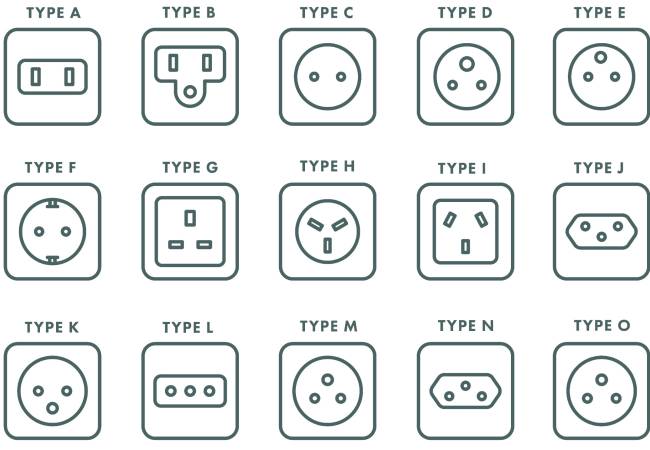
Money
Japan's currency: Japanese yen (JPY)
ATM Availability
We recommend obtaining some Japanese yen before arrival, although you should check the exchange rate carefully. Japan is a very safe country and the local people often carry large amounts without problems. Exchange facilities are fairly widely available, including at the airport on arrival, and it is also possible to change money in the bigger cities and towns.
ATMs are widely available at all convenience stores within Japan. This is the easiest and recommended option for international travellers wishing to withdraw cash.
Extra Expenses & Spending Money
Budget for optional entrance fees and transport fares not included in the itinerary (during free time in cities). The cost of these will vary according to individual preferences but a figure of around 14,600-18,200 (US$100-US$130) is reasonable.
For meals not included in the cost of the trip, budget around 2,000 yen (US$14) for lunch and 2,000-4,000 JPY (US$14-US$28) for dinner.
Tipping
Tipping is not expected or required in Japan. However, if you feel your leader has performed well over the course of your trip, you may want to show your appreciation of their services. The sum you choose to give is entirely personal, but as a guide we recommend approximately 5,500 yen (US$40) per person per leader, and 1,820-2,750 yen (US$13-US$19.50) per person for the driver.
Sustainability and Impact
As a certified B Corp, we’re on a mission to improve our social and environmental impact across all our adventures.
We do this through our innovative Thriving Nature, Thriving People plan.
This ‘nature positive’ approach is designed to help nature and communities thrive in harmony through practical solutions, such as reducing carbon and waste on our trips, supporting conservation projects through the Exodus Adventure Travels Foundation, and rewilding 100 square metres for every Exodus traveller.
Important Information
Your Safe Participation
When booking this trip, you should be confident in your ability to participate in all activities described in these Trip Notes. If you have any doubt about your suitability, please call us and ask to speak to one of the experts on this itinerary.
Although our leaders are well trained to deal with different capabilities, if they have any concerns about someone’s ability to safely take part in an activity, or their impact on other people’s enjoyment, we authorise them to take necessary action which, in some circumstances, may involve asking someone to miss that activity.
By booking this trip you agree to our Booking Conditions which clearly state that our leaders have the authority to do this. In these rare instances we will ensure anyone sitting out is safely provided for and offered alternative options where possible. Refunds will not be provided for activities missed and customers may be liable for additional costs incurred.
Seatbelts
All vehicles used by us should be equipped with working seatbelts, except where approved by us based on the vehicle type or journey. Wherever seatbelts are available, we require our customers to use them for their own safety, even where it may not be a legal requirement.
Travel Safety
For additional information please have a look at the travel safety advice page on our website.
How to Book
Speak to our friendly team of experts to plan your adventure:
- Check availability: our website shows real-time availability of our guided group tours, or contact our team by phone, email or live chat.
- Hold a space: You can provisionally hold a space on any guided group tour to give you time to finalise your travel plans.
- Confirm your booking: Payment of a deposit will complete your booking and secure your place on the trip.
After booking
You will receive a confirmation document and invoice, which includes extra information and guidance about your travel arrangements. Our dedicated Customer Operations team will help you with any pre-travel questions or arrangements and can easily add extensions or extra accommodation to your booking. Final Joining Instructions will usually be sent out two to three weeks prior to departure.
Adding transfers to your booking
If you have arranged your own flights and would like to add transfers to your booking, please provide your arrival and departure details to our Customer Operations team around four to six weeks before departure.
- Where free transfers are included, they are available for any flight but can only be added to your booking once we have received your flight schedule.
- Where group arrival and departure transfers are available, these operate at fixed times. You will need to arrive in time to meet the scheduled transfer. If the timings don’t align with your travel plans, our team can arrange private transfers once they receive your flight schedule.
Trip Note validity
Trip notes may be updated after booking; if any updates significantly impact the inclusions or itinerary you will be advised in writing. A link to the most up-to-date Trip Notes will be sent out with your Final Joining Instructions before departure.
The information in these Trip Notes is given in good faith. All holidays can be subject to unexpected changes, and occasionally it may not be possible to follow the itinerary as planned. In these circumstances we will make the best-possible alternative arrangements that maintain the integrity of the original itinerary.

